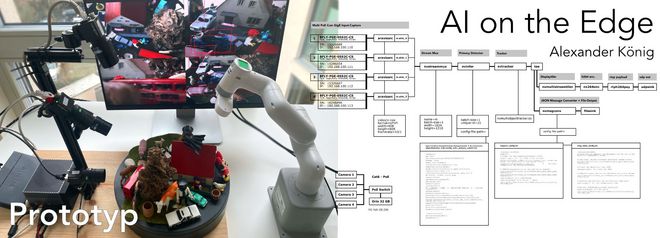4.2. Lecture by Dr. Alexander König about »AI on the Edge - A journey into Deepstreams«
We invite all interested parties to a lecture by Dr. Alexander König about his project »AI on the Edge - A journey into Deepstreams« followed by a discussion with Prof. Georg Trogemann. The event starts on Tuesday, 4 February 2025, 2 p.m., and can be streamed via BigBlueButton or live on youtube. The installation will be shown on Friday, 14 February 2025, at »Hybrides Lernatelier« at Amalienstraße 13.
The lecture will be presenting the project »AI on the Edge« – an experimental installation that sheds light on the technical and cultural dimensions of artificial intelligence. The focus is on a miniature model of a »smart world« that is classified and analyzed with the help of cameras and AI algorithms. The use of a robotic arm with an integrated camera enables participants to directly control and observe the system processes. The technology used (NVIDIA Deepstream on Orin Edge-Devices) reflects current developments and is authentic - the system could be used in real life. Only the reference world has been scaled, a fact that the AI does not recognize.
In addition to a detailed technical description of the edge computing systems used, the lecture also offers a cultural-theoretical reflection. The terms »artificial intelligence«, »Internet of Things«, »cloud computing«, »smart cities« and »robots« may seem like buzzword bingo at first glance, but they point to profound technological changes. These developments not only influence the way we deal with technology, but also work, production and consumption in an increasingly networked world. This is where global logistics come into play - in an economic, military and mathematical sense.
A central aspect of the research is the production of AI itself. The technical structure of such systems is based on pipelines: data is processed and passed through multiple sequential stages. This modules are then organized in so-called containers and orchestrated in complex IT architectures. This means that AI follows modern programming paradigms and is not monolithic, but divided into individual functional parts. The French philosopher Gilbert Simondon describes such processes as functional overdetermination, in which the individual parts are coordinated and interact with each other and get more and more integrated. At the same time, this is accompanied by a monopolization of knowledge, as Simondon noted back in the 1950s. In an economic context, this means that the organization, monitoring and control of work increasingly follow the abstraction levels of IT products. Data evaluation serves to optimize work performance, making efficiency verifiable and increasing competition.
The lecture focuses on the technical realities of artificial intelligence and examines the sub-areas of machine learning. Technical spheres of knowledge are analyzed and critically reflected upon, integrating historical and philosophical perspectives.
The focus is on the detailed development of the AI architecture based on edge computing. The project investigates how AI can be integrated directly into real applications without apps or server connections. In addition to technical aspects, the lecture also addresses personal experiences and cultural-theoretical reflections on dealing with AI. The interaction between technology and society will be highlighted. Particular attention will be paid to »digital sovereignty«, as edge devices enable local, independent projects.
The project was founded by the Kreativfonds of the Bauhaus-Universität Weimar.
Lecture »AI on the Edge - A journey into Deepstreams« by Dr. Alexander König and discussion with Prof. Georg Trogemann
Time:
Tuesday, 4 February 2025, 2 p.m.
Location:
Hybrides Lernatelier
Amalienstraße 13, room 003
99423 Weimar
Online:
BBB : https://meeting.uni-weimar.de/b/ale-vzm-fhr-krw
Livestream on Youtube: https://youtube.com/live/nsRGUC2kEjE?feature=share
The installation will be shown on Friday, 14 February 2025, 2 p.m. till 7 p.m. at »Hybrides Lernatelier«.



